|

|
Wolverhampton's Blue
Plaques
Queen Square,
Victoria Street & the Mander Centre
|
 |
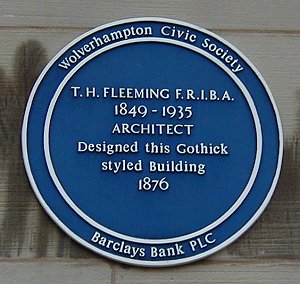 |
Commemorating:
Thomas Henry Fleeming who designed the Barclays Bank building
in Queen Square.
Sponsored by:
Barclays Bank P.L.C.
Location:
Queen Square. On the corner of Lichfield Street and Lich Gates.
|
| The building was built in two stages. The rear half
facing St. Peters was built first, the original entrance being
where the cash machine in Lich Gates now stands. The front half was
built a little later when Lichfield Street was widened, and replaced
a fine 17th century town house which was owned by John Gholditch,
who was a wine merchant. The two halves of the building are built in
the same Gothic style, using the same stone and so its not obvious
that the rear part was once a separate building.
The bank's main entrance in Queen Square
with the plaque just to the left.
|
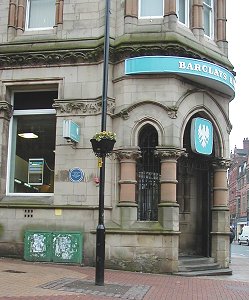 |
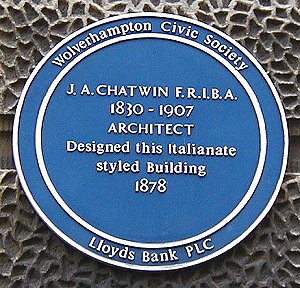 |
Commemorating:
J. A. Chatwin who designed Lloyds Bank.
Sponsored by:
Lloyds Bank P.L.C.
Location:
Queen Square, at its junction with Dudley Street.

|
| This side of Queen Square was rebuilt in the late
1870's and early 1880's, at the same time as the widening and
redevelopment of Lichfield Street. Birmingham architect, J. A.
Chatwin also designed the Art Gallery in Lichfield Street. Both
buildings are in an Italianate style. |
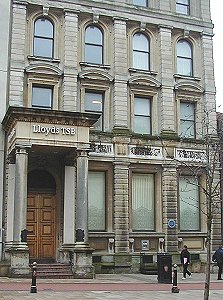 |
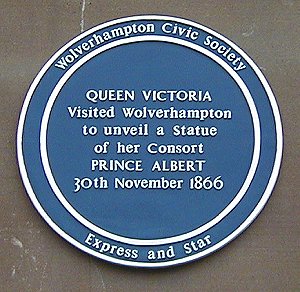 |
Commemorating:
Queen Victoria's visit to Queen Square in 1866.
Sponsored by:
The Express & Star.
Location:
On the west side of the HSBC Bank in Queen Square.

|
| Queen Victoria's husband,
Prince Albert, died in 1861.
The people of Wolverhampton led by Alderman Underhill raised the
money to
erect a statue in his honour. The statue in Queen Square
cost £1,150 and was sculpted by Thomas Thorneycroft.
The statue was completed in 1866, and
the Queen agreed to come in person for the unveiling, which took
place on November 30th 1866. It was an important day for the town. A
public holiday was declared and large numbers of people gathered to
see the Royal party as they toured the town centre.
Activities included illuminations and a spectacular firework display
at the racecourse. |
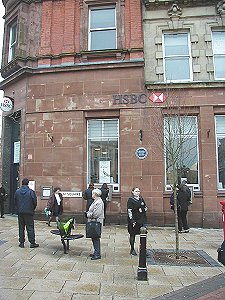 |
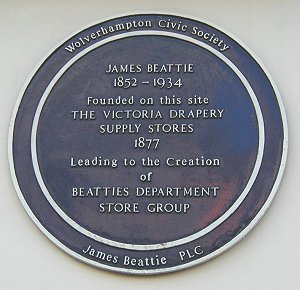 |
Commemorating:
James Beattie who founded the Victoria Drapery in 1877.
Sponsored by:
James Beattie P.L.C.
Location:
Victoria Street, on the front of the
store..
|
| Beatties, the well known department store in the
city, started life in 1877 as a small drapers shop in Victoria
Street, called the 'Victoria Drapery Supply Stores'. It was
founded by James Beattie who started with a capital of just £300 and
employed two assistants.
By 1895 he had an annual turnover of
£30,000 and had a staff of forty. The original premises on the
eastern side of Victoria Street was badly damaged by fire in 1896,
which led to the relocation and expansion of the business on the
opposite side of the street. As the business prospered, adjacent
premises were purchased and the store grew in size. James Beattie
died in 1934. |
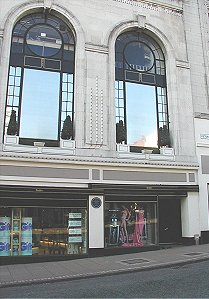 |
 |
Commemorating:
The Star & Garter coaching Inn.
Sponsored by:
Frank Mason
Location:
Victoria Street, on the front of
Pizza-Hut. |
| The Star & Garter was the town's main hotel. It
occupied the site of a house in which King Charles I sheltered
during the Civil War, and from this the hotel was named. The hotel
was built in about 1815 and extensively modified in 1836. The
building was demolished in the late 1960's to make way for the
Mander Centre. |
 |
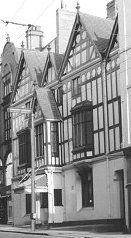
The Star & Garter in the early 1960's.
Photo courtesy of Eardley Lewis. |
 |
A poster advertising some of
the many coach services that called at the Inn. |
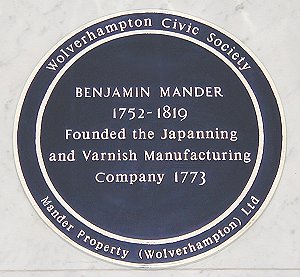 |
Commemorating:
Benjamin Mander
Sponsored by:
Mander Property (Wolverhampton) Ltd
Location:
Mander Centre. In the middle by the
lifts.
|
| In 1773 Benjamin Mander and his brother John,
founded Mander's works in St. John's Street. Benjamin was
a japanner, and the company produced paint and varnish for
decorating their products. The company went from strength to
strength and eventually closed the japanning side of the
business to concentrate on paints and varnish. The company
eventually became one of the largest printing ink manufacturers.
The St John's Street premises closed in 1965. |
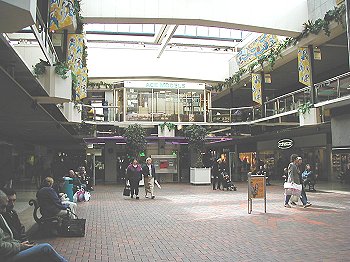 |
|